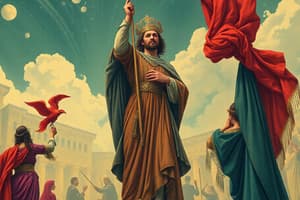Podcast
Questions and Answers
Who was Camillo Cavour?
Who was Camillo Cavour?
A shrewd ruthless politician that was determined to build a new, united Italy. He was a monarchist who believed in Realpolitik.
What role did Giuseppe Garibaldi play in the unification of Italy?
What role did Giuseppe Garibaldi play in the unification of Italy?
He was a long-time nationalist and ally of Mazzini who, with weapons from Cavour, invaded Sicily and captured Naples.
Who founded the Young Italy movement?
Who founded the Young Italy movement?
Giuseppe Mazzini
What was the purpose of Young Italy?
What was the purpose of Young Italy?
What position did Victor Emmanuel II hold?
What position did Victor Emmanuel II hold?
What do Anarchists believe?
What do Anarchists believe?
What is emigration?
What is emigration?
What does Risorgimento refer to?
What does Risorgimento refer to?
What was preventing Italy from being unified?
What was preventing Italy from being unified?
What were some reasons to unify Italy?
What were some reasons to unify Italy?
What challenges were faced by unified Italy?
What challenges were faced by unified Italy?
Flashcards are hidden until you start studying
Study Notes
Key Figures in Italian Unification
- Camillo Cavour: Shrewd politician and monarchist who aimed to unify Italy and end Austrian dominance, focusing on annexing Lombardy and Venetia through Realpolitik.
- Giuseppe Garibaldi: Nationalist leader and ally of Mazzini, known for commanding the Red Shirts in the successful invasion of Sicily and capture of Naples using arms provided by Cavour.
- Giuseppe Mazzini: Founder of the Young Italy movement, an influential nationalist figure advocating for a unified, independent, and republican Italy.
- Victor Emmanuel II: Constitutional monarch of Sardinia who led the Risorgimento movement; became the first crowned king of Italy after unification, with Cavour as his Prime Minister.
Important Movements and Ideologies
- Young Italy: A secret society established by Mazzini aimed at forming a united and free Italian republic, emphasizing civic rights and national identity.
- Risorgimento: The broader nationalist movement that encapsulated various efforts and ideologies aiming for Italian unification under a singular government.
Challenges to Unification
- Italy was fragmented into three separate states, with a prevalent local identity that hindered the idea of national unity.
- Differences between the more prosperous North and the impoverished South created economic and social divisions post-unification.
- The Catholic Church opposed the seizure of the Papal States, contributing to resistance against the new government among Catholic Italians.
- Voting rights were not universally granted, leading to social unrest characterized by sabotage, strikes, and violence.
- Italy faced a scarcity of natural resources, complicating economic development after unification.
Context for Unification
- Common linguistic, historical, and geographical ties among Italians were significant motivators for unity.
- The elimination of trade barriers was seen as a potential catalyst for economic growth and cooperation among the various Italian states.
Studying That Suits You
Use AI to generate personalized quizzes and flashcards to suit your learning preferences.





